- News
- Reviews
- Bikes
- Components
- Bar tape & grips
- Bottom brackets
- Brake & gear cables
- Brake & STI levers
- Brake pads & spares
- Brakes
- Cassettes & freewheels
- Chains
- Chainsets & chainrings
- Derailleurs - front
- Derailleurs - rear
- Forks
- Gear levers & shifters
- Groupsets
- Handlebars & extensions
- Headsets
- Hubs
- Inner tubes
- Pedals
- Quick releases & skewers
- Saddles
- Seatposts
- Stems
- Wheels
- Tyres
- Tubeless valves
- Accessories
- Accessories - misc
- Computer mounts
- Bags
- Bar ends
- Bike bags & cases
- Bottle cages
- Bottles
- Cameras
- Car racks
- Child seats
- Computers
- Glasses
- GPS units
- Helmets
- Lights - front
- Lights - rear
- Lights - sets
- Locks
- Mirrors
- Mudguards
- Racks
- Pumps & CO2 inflators
- Puncture kits
- Reflectives
- Smart watches
- Stands and racks
- Trailers
- Clothing
- Health, fitness and nutrition
- Tools and workshop
- Miscellaneous
- Buyers Guides
- Features
- Forum
- Recommends
- Podcast
feature
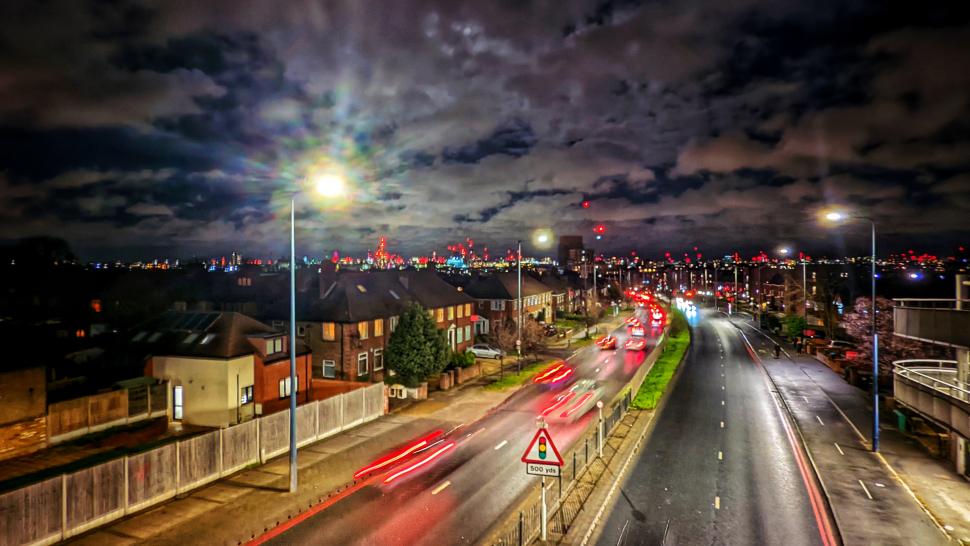 A40 in Acton (copyright Simon MacMichael)
A40 in Acton (copyright Simon MacMichael)‘The War on the Motorist’ deconstructed — looking at the truth behind the myths
The so-called 'War Against The Motorist' has been around for years – in the UK it’s something the Conservative-Liberal Democrat coalition government pledged to end immediately after the 2010 general election, a promise repeated by Rishi Sunak when he challenged Liz Truss for the leadership of the Tory party last year.
With the trope of how hard-pressed drivers are supposedly getting a raw deal regularly trotted out in some parts of the media, it’s timely to explore just how much of that is based on fact and how much is a myth, especially with politics in the UK and elsewhere becoming increasingly polarised in recent years.
In the first part of this two-part feature, we take a look at some of the general issues surrounding motoring in the UK, often ignored or at best glossed over in the media, with the second instalment going on to address some of the current flashpoints in this supposed conflict, the falsehoods being used to push back on efforts to get motorists to rethink their habits and make our towns and cities more liveable, as well as what the future may hold.
Why does this matter to cyclists?
It’s worth mentioning here that while road.cc is of course a website focused on cycling, a straw poll of staff, albeit a small sample, shows above-average access to a car; the two of us without one both live in London, which is an outlier to the national figures, not least because of the comprehensive public transport links here.
But we also found that people working here are way above the national average in using bikes to replace cars for short trips such as shopping, commuting, or meeting friends. We’re certainly not anti-car – we’re all for using them sensibly, and replacing trips made by them by walking, public transport and, of course, cycling, where practical.
To our knowledge, that’s the view of pretty much all road.cc staffers and contributors , but it won’t have escaped your notice that a large part of the media – the one obsessed with pushing back on what it terms a ‘woke’ agenda – latches onto any effort to encourage people to drive less, or promote other ways of getting around, especially for short trips, as somehow being an attack on the ‘rights’ of motorists.
There's a growing school of thought that suggests such rhetoric has real-world consequences, influencing people's attitudes and behaviour towards people who can't or don't drive. As only 2% of UK journeys are cycled according to statistics, the idea that motorists could feel like they are being penalised to suit a minority may be an unsettling thought for cyclists just trying to get around safely.
Before addressing the issues, it's worth mentioning that we're focussing on the UK's so-called 'War on the Motorist' in this article; however, it is a sentiment we've regularly seen repeated in other countries such as the United States and Australia too.
The ’right’ to drive
That word ‘right’ is in inverted commas for good reason. Driving a motor vehicle is something allowed under licence, with the motorist having to satisfy the authorities through passing the driving test their competence to take to public roads in charge of it (and even then, there is no shortage of cases in which someone behind the wheel of a car, van or truck has chosen to drive despite being banned, or never having obtained a licence, sometimes with fatal consequences).
That is just one of the problematic issues surrounding much media coverage of attempts to encourage people to drive less – whether that be through imposing speed limits on certain roads, or restricting access to them for vehicles that pollute more, or drivers who use them as short-cuts, among other things, issues that we will be taking a closer look at in a follow-up article tomorrow.
Let’s take a closer look at some of the assumptions behind reporting of motoring issues in the UK, the arguments often used to try and reject efforts to curb car use, and some home truths – one of those a ticking time bomb that is likely to hit the headlines in the coming months.
Everyone has a car
No they don’t, although you could be forgiven for thinking that the way that media outlets including BBC News report on issues such as rises in the price of fuel, and the assumption that car ownership is pretty much universal is one that underpins much of the coverage.
Data from the 2021 Census released earlier this month reveals that around nearly one in four households in England and Wales does not have access to a car or van.
That rises to around four in ten in cities including Manchester, Liverpool and London – where, in several boroughs closer to the centre of the capital, car ownership is very much in the minority, at just one in three households.
Even in the Royal Borough of Kensington & Chelsea – which has persistently blocked safe cycle routes on its main roads – just over four in ten households have access to a car or van, while nearly six in ten do not.
The cost of motoring keeps going up
Not true. In real terms, it’s been getting cheaper compared to most other things over at least the past quarter of a century.
Last year, the Scottish Parliament’s Information Centre (SPICe), in a blog post seeking to answer the question, ‘Is there a war on the motorist?’, highlighted that between May 1999 and July 2022, the cost of motoring in Great Britain actually fell by 19 per cent when compared with inflation during the same period, as measured by the Retail Prices Index (RPI).
Sourced from the Office for National Statistics, the figures show that during the same period, rail fares have increased by 31 per cent during the same period, and bus and coach fares by a whopping 102 per cent – scant incentive for people to switch mode of transport to more sustainable ones that help reduce the amount of motor traffic on our roads.
Fuel Duty is unfair
Back in 1993, John Major’s Conservative government introduced the Fuel Duty Escalator, aimed at reducing pollution from vehicle emissions and the need to build new roads to cope with the forecast increase in motor traffic, initially setting it at 3 per cent above inflation annually, and later that year increasing it to 5 per cent above inflation.
After Labour’s landslide under Tony Blair in 1997, it rose to 6 per cent above inflation, and stayed there until 2000 when, following a national fuel shortage amid the rising price of oil, Chancellor of the Exchequer Gordon Brown said that from then on it would only rise in line with inflation.
But once the Conservative-Liberal Democrat coalition came to power in 2010, George Osborne and subsequent Chancellors froze fuel duty – with one of his successors, the current Prime Minister Rishi Sunak, even reducing it last year.
Put another way, the 20.44 pence payable in duty on a litre of unleaded petrol from March 1989 rose steadily over the following two decades to stand at 58.95 pence per litre in early 2011 – and rather than increasing each year, as previously happened, has not risen since and following last year’s cut, is now 52.95 pence per litre.
But we pay ‘road tax’
If you look at posts concerning cyclists on social media, or on national or local newspaper websites, it won’t be long before someone raises the issue of ‘road tax’ as somehow giving people who drive motor vehicles precedence over other road users.
The problem there, of course, is that road tax itself was abolished in the 1930s, partly at the instigation of Winston Churchill, who foresaw the problems that claims of ownership of and entitlement to the highway would bring about unless drivers were swiftly dissuaded of the notion that they alone paid for the public highway.
What many motorists do pay is in fact Vehicle Excise Duty, based on emissions, with electric vehicles currently zero-rated, and even then if the car is being leased, it is the leasing company’s responsibility to pay it, not the drivers.
Instead, road building and maintenance and repair is paid for through general taxation, whether that be through income tax or council tax, and the amount of money raised through VED does not come close to meeting the bill.
In the current financial year, 2022/23, the total amount of VED paid is expected to be £7.2 billion across the UK according to government spending watchdog, the Office for Budget Responsibility – compared to an estimated £12 billion spent annually by central government and local councils in England alone.
Much of that will go on towards a few dozen road enhancement schemes on motorways and major A routes, such as junction overhauls and road widening to create an extra lane to ease congestion – even though it is well documented that doing so encourages what is known as ‘induced demand’ with the extra capacity created encouraging more drivers to take to those roads, often replacing journeys they may previously have made by public transport.
And what that means in practice is that the tens or even hundreds of millions of pounds spend to widen such roads swiftly results in the kind of traffic jam that prompted the investment in the first place – except now, with even more drivers sitting frustrated in their cars, though with barely a thought that they might be contributing to that congestion in the first place.
There are already too many motor vehicles on the road …
The simple fact is, there are too many motor vehicles on the road. According to data released by the Society for Motor Manufacturers and Traders (SMMT) last year, there were 40.5 million vehicles in the UK in 2021 – 4.7 million more than there had been in 2012, an increase of 13.3 per cent.
In 2021, 35 million of those vehicles were cars, a slight fall (0.2 per cent) on the previous year, which had also experienced a slight dip – the first consecutive annual decrease in car ownership in more than a century, according to the SMMT, which attributed the fall to component shortages and supply chain issues due to the pandemic.
However, 2021 saw an increase of 4.3 per cent in the number of light commercial vehicles on the road, with 4.8 million now in circulation – a rise fuelled in large part by consumer purchases moving online.
… and their number is forecast to rise
That two-year dip in the incessant rise in car ownership was also partly due to people deferring new car purchases as a result of the uncertainties caused by the pandemic – although in its latest quarterly forecast, published towards the end of last year, the SMMT is expecting the number of new car registrations next year, 2024, to be 18 per cent higher than they were in 2021.
Part Two will look at steps being taken to curb car use and make it easier for people to choose alternative options such as active travel – as well as the reception they have received, including addressing some of the misconceptions and at times outright misinformation put forward by opponents of such initiatives.
Latest Comments
- StevenCrook 0 sec ago
All of your price links appear to be pointing to the non pro version...
- wtjs 11 min 3 sec ago
I would have thought having his passenger lean across him would be even more dangerous than him filming it himself...
- mdavidford 23 min 6 sec ago
Shops are so last century - the future is all about analysing your brainwaves and just sending you what you want before you ever know you wanted it.
- BikingBud 42 min 8 sec ago
But could you retro fit an 8 track player?
- Surreyrider 47 min 6 sec ago
Good try. Won't work.
- Surreyrider 49 min 34 sec ago
More than six times over the legal limit? She's the winner here. Her punishment is insufficient.
- Smoggysteve 1 hour 3 min ago
Sram only have a foot in the market with regards to road bike abd mountain bike (and loose variations of) The rest of the bicycles sold around the...
- wtjs 2 hours 19 min ago
so my hands are near the brake levers...
- PRSboy 3 hours 57 min ago
I came here on a small boat from the Road Cycling UK forum after that croaked a few yrs ago.
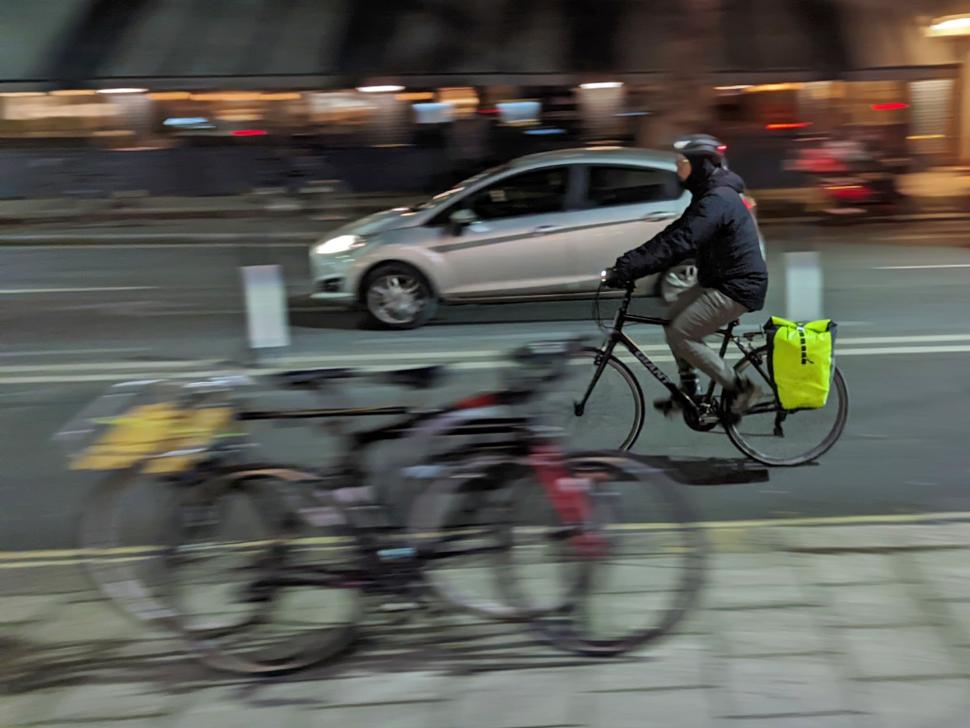
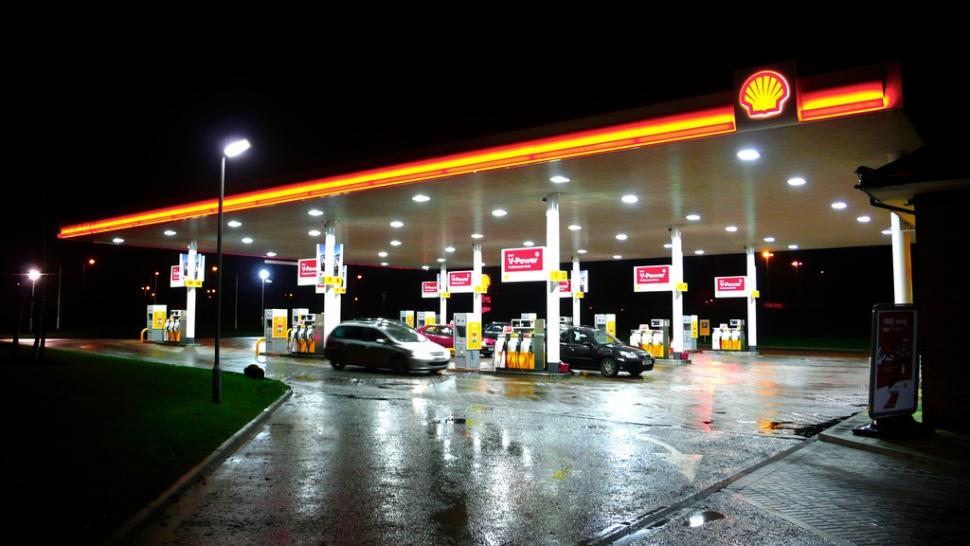
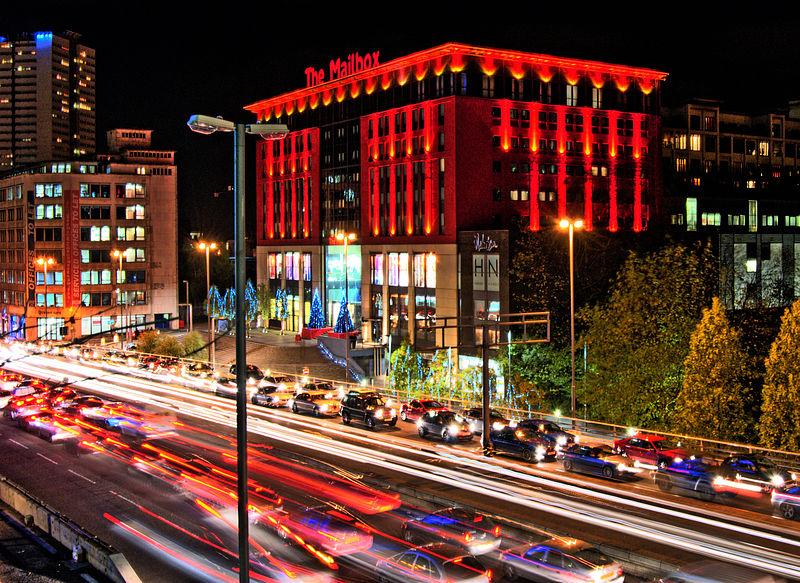
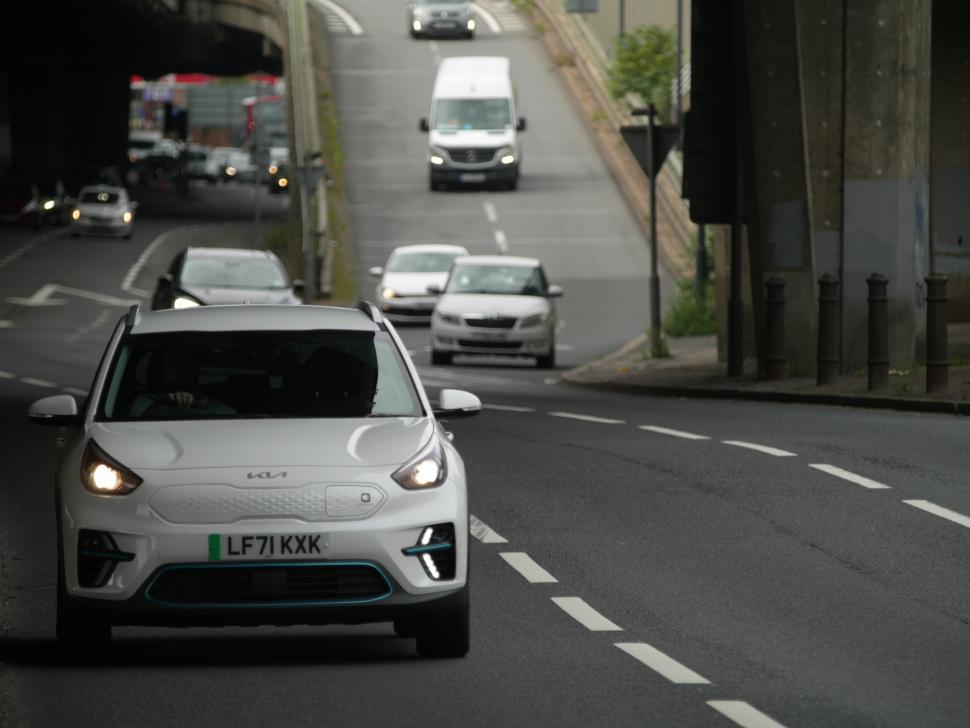
Add new comment
52 comments
I have a car and two motorbikes. I choose to cycle for short journeys whenever possible because it's quicker and easier and more pleasant. And it keeps me fit. Driving a car in London is like pulling teeth and I avoid it whenever possible. For commuting I either go by motorbike or by bicycle and train. In the 30+ years I've lived in London, I have never understood why people will willingly commute by car in and around the city. Most of the drivers I pass on my bicycle/motorcycle commute have just one person inside and this is incredibly inefficient.
The 'war on motorists' is an illusion. I get very tired of people moaning about the ULEZ in London for example. They conveniently forget about the threat to human health from exhaust pollution.
Around here if there is a war it is one being waged on local communities by developers, hungry to maximise profit and not giving a damn about the areas they build in. Impact on driving is a side effect of this but not what should be the real concern, all this is, is a distraction. In this case this is the area around the laughably called "Ebbsfleet Garden City". Nothing meaningful has been done to account for the impact of tens of thousands of houses and identikit blocks and blocks of flats. Additionally, nothing has been done in terms of active travel and cycle infrastructure, just more shared use pavements through the developments. So it isn’t the fault of cyclists.
The issue of infrastructure is wider reaching and more concerning. It has just been disclosed that plans for a new GP surgery has been cancelled. Blocks and blocks of flats are still going up, and it is now nigh on impossible to get a GP appointment. Additionally our GP has merged with two others compounding the issue.
It suits to pitch people against each other to distract from the reality of what is happening.
Yes this is important. If you think "we can't change because roads" just try dealing with areas where you've permitted development which bakes in car dependency! No local amenities or jobs. No connections with public transport. "Drive to the park / school / doctor / shops". Lots of parking, connected to fast, busy distributor roads but hey there's a muddy unlit path for any weirdos who want to walk to a back street so they can pathfind their way to a local store.
Edinburgh's currently taking the talk about green plans for growth and meanwhile we're still building lots of this stuff and seems to have plans for more. Sometimes at the expense of long-proposed active travel routes. And if course more relief roads.
The council *have* come a long way - but it's still business as usual in many respects.
Public transport is a major issue. Local councillors are in a contiunal fight with Arriva who are hell bent on canning services people rely on.
Southeastern trains are a joke. I cycle 5 miles to a train station becuase the sevices past there have been drastically cut, some stations now have no service to Charing Cross at all. If I want to use the train to my nearest station from Charing Cross there are now only 2 direct services an hour even at peak time.
The area has pretty much been trashed by Bellway etc.
the problem I see locally is the developers arent interested in building these new estates with active travel in mind, they only do it because the councils planning regs (which btw say each new house must have a minimum of 2 parking spaces) says they must cater for it, but so you get the absolute worst kind of box ticked stuff thats not going to convince anyone to ditch their car for active travel, its just a mash up of shared paths, paint on road that just vanishes and often quite scary roundabouts setup to improve vehicle flow off the estate.
and then this estate sits isolated disconnected from any nearby community, usually by a busy road, wont be served by bus routes, or any transport option other than a car, and that might just be to drive 1 mile to the nearest supermarket to shop.
Yes. I did a safari round some of the ones to the west of Edinburgh. For the full picture I think the use of the location had been in planning for quite a few years. However actual development is much more recent.
It's exactly as you describe - only they have added a bus stop. Otherwise - very obviously built for car commuters - on busy road, lots of parking, no sign of bike storage not even for flats (I was surprised by this, I thought this was now a requirement but maybe development was approved prior? )
There was a cycle path connecting to a back road on the design, but not done yet. Contrast NL where this is considered essential infra and may be put in place, like roads, before the houses.
https://bicycledutch.wordpress.com/2018/09/11/a-new-bridge-in-a-resident...
The counter argument to the road tax argument that it's not called road tax but VED is stupid. People don't care what it is officially called, they're making an argument about the principle of road tax or VED or whatever else you decide to call it that day.
The distinction is an important one though, the reason that Churchill abolished road tax in 1937 was because, as he said, "Entertainments may be taxed; public houses may be taxed ... and the yield devoted to the general revenue. But motorists are to be privileged for all time to have the tax on motors devoted to roads? This is an outrage upon ... common sense." If it still was road tax, hypothecated for road maintenance only, there would be more justification in the "We own the road because we pay for them, cyclists don't so they shouldn't be on them" argument.
I guess we'll just have to fall back on the argument that the payment is for polluting, and that roads are funded out of general taxation.
I pay VED at a high rate, but the issue I have is one as a general tax payer. That being that whether driving or cycling, the roads around here are in a shocking state. Pot holes abound and now they have taken to putting signs up to simply state road markings are worn, rather than actually fix them.
That will be the heavier vehicles doing that.
Parroting that just masks the issue of a complete lack of maintenance.
Vehicle weight is moot when it comes to wearing out markings and has nothing to do with the debris littering the road.
I remember about 10 years ago when the council got new road sweepers, they were like kids with a new toy and they were out all the time. Now you never see them. I cycle along a dual carriageway for my commute and no longer use the cycle lane, instead using the pavement as it is too dangerous, littered with dirt, debris and pine cones and tree branches. I have reported it numerous times to no avail.
I'm parroting nothing.
An inconvenient truth?..
If a road is designed to take a loaded HGV it can take a Range Rover, there's your inconvenient truth.
The issue is lack of maintenance and maintenance done to a tiny budget. Slapping tar down and spinkling stone on it doesn't last. An example is the main road here, there has been ample opportunity to properly resurface the road, but the cheap option has been taken. So we have a patch work of repairs after developers have had utility companies in, not to mention the numerous closures from Thames water digging bits up.
Vehicle axle weight (and thus forces generated by accelleration / decelleration presumably) most certainly is relevant to pot holes / road damage in general. To what extent road markings are worn out more by heavier vehicles or whether it's just "more car, more wear" is another matter. But if the road is trashed the markings will go with it. Strangely the double-yellows seem to wear proportionally more at bus stops...
Road debris in Edinburgh can certainly be plant-based, litter, but also bits of vehicles. The annual winter gravel traps though would appear to come from... the roads getting trashed (freeze-thaw + mechanical action). See "heavier vehicles" again.
You're right to note that indifferent maintenance is a thing. I'd say further it's a failing in our whole road ownership and management system. We have public space, maintained by public funds, but we give utilities companies and builders a pass to dig up. Often. That's then remediated via a chain of contractors so there doesn't seem to be much accountability. Nominally there should be but at least some councils seem to let people mark their own homework on this one and give a shrug of "no resources to chase it" to the task of ensuring proper repairs.
Never mind the council's own maintenance efforts!
Of course some of this is kinda beyond them. Whoever is in post has inherited the built environment and the government funds what it does. What is not OK is that we appear to be repeating the same mistakes, baking in motoring dependence.
Yeah, that's because we keep building new roads hoping they'll solve the problem of too much driving, when we can't afford to maintain the roads we already have. It's a Ponzi scheme, well described by Charles Marohn.
Motorists don't pay the full costs of motoring and it all is done via taxes which aren't directly linked to road use either.
Long version - our governments have been strongly influenced - initially by rich folks with cars but continually by the motor and fuel industries. This has led to the situation where drivers pay an amount of tax to central funds. That amount covers the costs for building roads and there is a nominal contribution to generation of carbon dioxide. All the other expenses- health, pollution etc. are still covered from government funds. That's the taxes we all pay. We're not all drivers, so drivers are being subsidised.
Oddly enough said industries tend not to run their adverts this way: "enjoy driving - while someone else is picking up part of your tab!"
You are not paying road tax with VED, you are paying dirty in the city car tax. An electric pays nothing, and you can find used 4 seaters for less than 10K.
Cars subject to VED of more than £0 should be heavily restricted as they are unjustifiable excessive polluters (CO2, NOx, hydrocarbons etc). Electric cars still pollute with tyre and brake dust as well as any non-renewable electricity used.
Even if it was road tax, the pro motorist argument still hinges on a principle that does not exist in accessing other forms of public service or amenity. For example, paying tax is not a pre requisite to using the NHS, or calling an emergency service. If priority to use public highways was based on how much road tax has been charged on a particular vehicle then I guess we had all better get used to being banned from the roads at busy times to let the lorry drivers get around unimpeded.
Ask any of the believers in the "war on motorists" what the driving experience is really like in this country, and they'll say it is terrible. Congested, difficult to park, and plagued by angry arseholes. Ask them what should be done to fix it and they'll say don't you dare change a thing. They don't have solutions of their own, beyond ripping up and rolling back what little has been done in the last couple of decades that doesn't exclusively benefit them. Even the biggest petrolhead has to admit that you cannot build flyovers through cities and motorways to every town anymore. Deep down they know the system we have now was built mostly for their benefit, that it is as good as it is ever going to get for them, and they're just playing the victim to forestall any moves to share things more equitably.
Agree. Drove my van to work yesterday as it hadn't had a run for 10 days (I use it a lot more in the summer in support of my sports). Bloody miserable; got tangled up with the bin/recycling trucks on the way there and coming home it felt like I was a contestant in a Roman chariot race.......and this was half term.
Pages